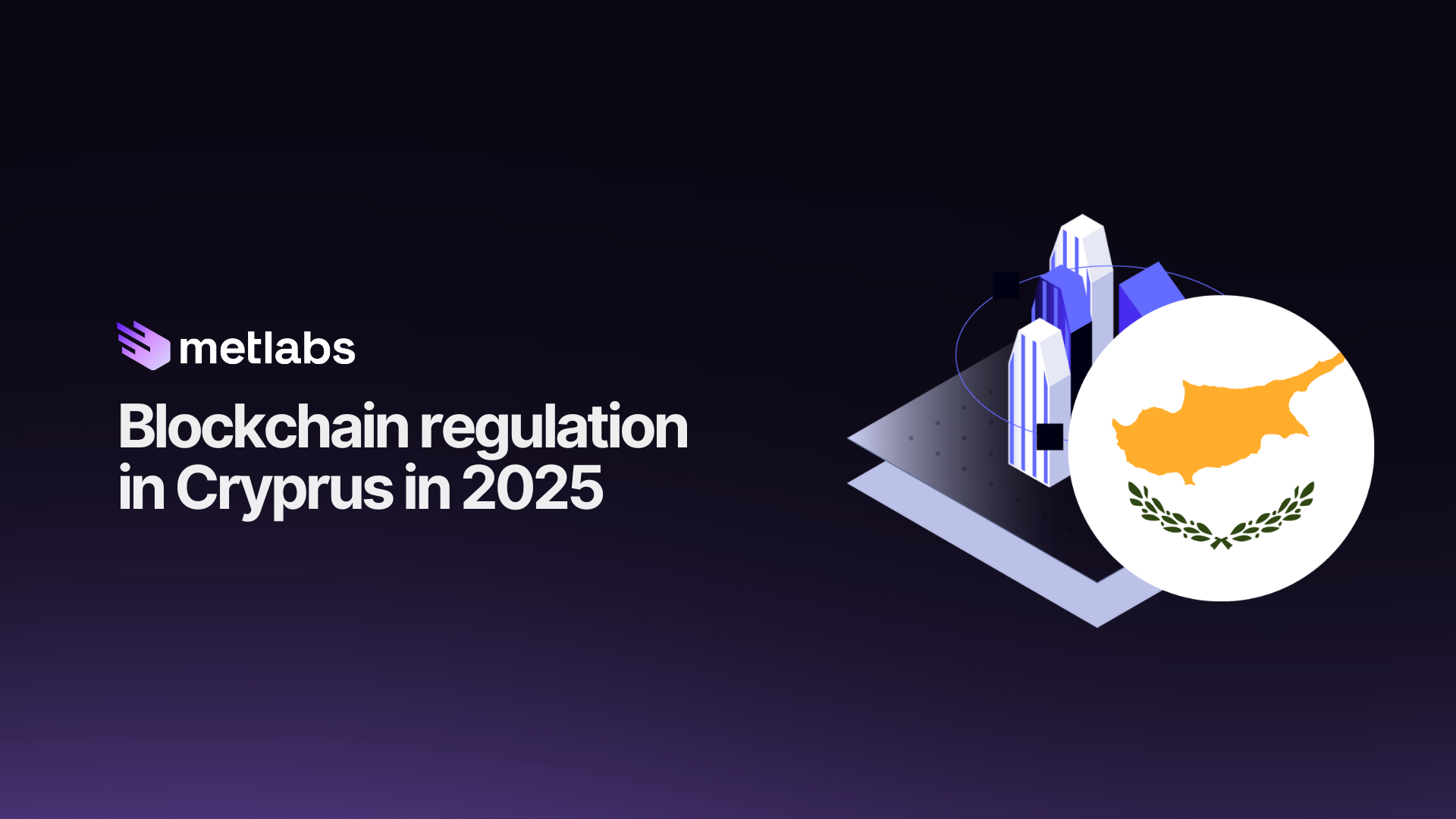The adoption of blockchain technology and asset tokenization is advancing at a rapid pace, but the real engine driving its global development is the existence of a clear, consistent and innovation-friendly legal framework.
Some countries have already established themselves as regulatory benchmarks, establishing specific rules for cryptoassets, DLT infrastructures and token issuance with legal backing. In this article we show you the relevant information about blockchain regulation in Cyprus, which you can use as a guide if you are looking to operate internationally or evaluate different strategic locations.

Current legislation on blockchain and virtual assets in Cyprus.
MiCA Regulation (Markets in Crypto-Assets Regulation)
Establishes the EU’s first comprehensive legal framework for regulating cryptoasset issuers and service providers (CASPs). Covers stablecoins, utility tokens, electronic money tokens (EMTs), asset referenced tokens (ARTs), and custody or exchange platforms. Requires prior authorization, governance requirements, solvency, transparency, and user protection.
MiFID II (Markets in Financial Instruments Directive II)
European Directive that regulates the markets of traditional financial instruments and also applies to cryptoassets considered as financial instruments (e.g. security tokens). It establishes rules on transparency, investor protection, advisory services, order execution and prudential requirements for investment firms.
CySEC Directive on Cryptographic Asset Provider Registration in Cyprus
Regulates the creation, operation and supervision of the CASP Registry. Sets out requirements for registration, suitability of management bodies, cybersecurity and internal controls. As of October 2024, CySEC has frozen new national CASP applications in transition to MiCA, although previous registrations continue to operate until July 2026.
Prevention and Suppression of Money Laundering and Terrorist Financing Act 2007 (as amended)
This law, adapted to European directives, imposes anti-money laundering and terrorist financing prevention obligations on all cryptoasset service providers. It requires the implementation of KYC policies, suspicious transaction reporting and controls on the origin of funds, under the direct supervision of CySEC, with severe penalties in case of non-compliance.
Tokenization makes it possible to digitally represent real-world assets through blockchain, but for it to have legal value, it is essential that there is a regulatory framework that recognizes this operation. Cyprus adopts its own approach, establishing specific rules for the issuance, custody or trading of tokens. In this block we explain how asset tokenization is regulated from a legal point of view, taking an advanced jurisdiction such as Cyprus as an example.
Regulation of asset tokenization in Cyprus
The regulation of asset tokenization in Cyprus is based on the European framework, mainly the MiCA Regulation, which provides legal certainty for the issuance and management of tokens representing both financial and non-financial assets. Token issuers must publish detailed documentation on the nature, risks and conditions of the tokenized assets, and comply with strict licensing and transparency requirements, especially in the case of stablecoins and asset referenced tokens.
For security tokens, MiFID II and national securities markets regulations require authorization as an investment services firm and trading on regulated platforms, ensuring investor protection and market integrity. Tokenization of non-financial assets, such as real estate or art, is permitted and subject to case-by-case analysis, applying civil, tax and consumer protection legislation, in addition to general MiCA and AML/CFT obligations.
Cyprus maintains an Innovation Hub to facilitate dialogue and adaptation of innovative projects and participates in the EU DLT Pilot Regime, enabling controlled experimentation with blockchain-based market infrastructures. The Cypriot regulatory environment, in transition towards full MiCA implementation, provides a robust and harmonized framework for tokenization, with high compliance and oversight standards for investors, businesses and institutions.
Digital asset regulatory bodies and authorities in Cyprus
Cyprus Securities and Exchange Commission (CySEC)
It is the national authority in charge of regulating investment services, securities and financial markets in Cyprus, including the supervision of CASPs under the MiCA Regulation. It administers the registry of cryptoasset service providers, reviews license applications, monitors regulatory compliance and may sanction unauthorized activities.
Financial Intelligence Unit (MOKAS)
MOKAS is the competent authority for the prevention of money laundering and terrorist financing. It supervises CASPs in their AML/CFT obligations, including KYC, transaction monitoring and suspicious transaction reporting, in coordination with CySEC. Maintains cooperation with European authorities and applies FATF directives and European regulations.
Central Bank of Cyprus
The Central Bank of Cyprus does not directly regulate cryptoassets, but participates in the implementation of policies related to digital payments, stablecoins and financial security. It cooperates with CySEC in the analysis of systemic risks and in the consultation framework for products linked to the digitization of the euro and the adoption of DLT technologies in the banking sector.
Launching a business based on digital assets requires more than just technology: it is also necessary to comply with legal requirements such as licensing, registration and regulatory obligations. These conditions ensure that the business model is viable and sustainable over time, and that it meets transparency and fraud prevention standards. In this section we explore what licenses are typically required and what compliance criteria blockchain companies operating in Cyprus must follow.

What licenses and requirements are needed to trade cryptoassets in Cyprus?
CASP License (MiCA)
CASP licensing is mandatory under the MiCA Regulation for exchanges, custodians and issuers of ART and EMT tokens operating in Cyprus or the EU. The license must be obtained from CySEC or the relevant authority of another member state and involves capital, governance, user protection and technical security requirements. As of October 2024, CySEC has frozen new applications for domestic CASPs transitioning to MiCA.
Cyprus Investment Firm (CIF) for financial instruments
Companies wishing to offer services on cryptoassets considered financial instruments, such as derivatives, must obtain a license as a Cyprus Investment Firm (CIF) under the supervision of CySEC. This license requires capital requirements, risk management, MiFID II compliance and investor protection, allowing the European passport to operate throughout the EU. The CIF is mandatory for trading security tokens, CFDs, options and futures.
Pre-registration with CySEC
It is imperative that operators are registered in the CASP public registry administered by CySEC, which publishes information on authorized services, responsible managers and legal structure. This registry is a requirement for both transparency and ongoing supervision.
AML/KYC compliance
Cryptoasset service providers in Cyprus must strictly comply with the Prevention and Suppression of Money Laundering and Terrorist Financing Law, as well as CySEC’s AML/CFT directives. This involves customer identity verification, transaction monitoring, suspicious transaction reporting and regular auditing of systems. Non-compliance can lead to sanctions, including fines and revocation of the MiCA license.
Are you exploring developing your blockchain project in Cyprus?
At Metlabs we help companies like yours and offer comprehensive support in the development of blockchain projects and tokenization of assets such as real estate, carbon credits, commodities, intellectual property, financial instruments, franchises and more, fully aligned with blockchain regulation in Cyprus and international regulatory standards.
Contact us and find out how we can help you meeting all your business model needs, from technical validation and structuring to design, development and implementation of custom blockchain solutions, ready to scale from day one.



